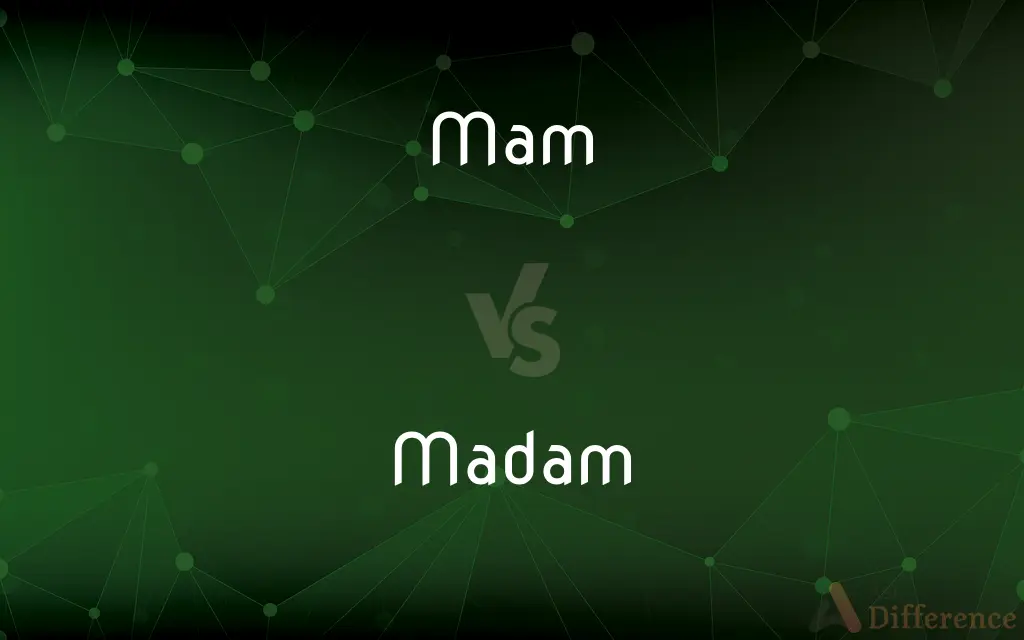Mam vs. Madam — What's the Difference?
Edited by Tayyaba Rehman — By Fiza Rafique — Updated on November 2, 2023
"Mam" is an informal, often regional, variant of "ma'am," a term of respect for women. "Madam" is a more formal address for women, often preceding a surname or used alone.

Difference Between Mam and Madam
Table of Contents
ADVERTISEMENT
Key Differences
Mam is colloquial and often used in dialects within certain English-speaking regions, akin to "mom" or "ma'am". Madam, however, carries a more formal tone and is used in polite or formal speech as a courteous form of address for a woman. Both terms are used to show respect, but the contexts in which they are used differ significantly.
The term mam could be considered more intimate or familiar, sometimes used within families or close communities. Madam, in contrast, suggests a degree of distance or formality and is less likely to be used among close acquaintances. Mam feels more casual, while madam is decidedly proper.
In some places, mam is commonly used where "mom" or "mum" might be elsewhere, referring to one's mother. Madam, on the other hand, is not typically used as a synonym for mother. Instead, madam might be used in professional settings, such as addressing a customer or a person of higher status.
Mam can be used as an affectionate or informal substitute for ma'am, especially in regions like the UK or Ireland. Madam is universally recognized and is the standard form in formal English, often appearing in official titles, such as Madam Secretary or Madam Chairwoman.
Mam may not always be understood outside of its regional context, potentially leading to confusion in international or diverse settings. Madam has global recognition and is the appropriate choice in international English and formal written communication. Mam's familiarity could be inappropriate in professional scenarios where madam is expected.
ADVERTISEMENT
Comparison Chart
Formality
Informal, familiar.
Formal, respectful.
Usage
Regional, colloquial.
Widely accepted.
Context
Often personal or familial.
Professional, formal address.
Variance
Can vary in pronunciation.
Standard pronunciation.
Recognition
Limited outside certain regions.
Recognized internationally.
Compare with Definitions
Mam
Affectionate term for one's mother, especially in the UK/Ireland.
I'll ask mam what's for dinner.
Madam
A formal title for a woman, often in authority.
Madam President addressed the assembly.
Mam
Casual variant of ma'am used in conversation.
Excuse me, mam, you dropped this.
Madam
A term of respect used in service industries.
Your table is ready, madam.
Mam
Regional term of respect or familiarity.
Mam, could you tell me the time?
Madam
Used before a surname to address a married woman.
Is this Madam Smith's residence?
Mam
A colloquial term for "ma'am" or "mother".
Can you help me with this, mam?
Madam
Can indicate a woman of high social rank.
The invitation was addressed to Madam Chancellor.
Mam
Informal address for a woman in some dialects.
Sorry, mam, I didn't see you there.
Madam
Madam Used as a form of polite address for a woman
Right this way, madam.
Mam
One's mother
My mam would have had a fit if I'd gone out dressed like that
I had to look after the other children while Mam worked
Madam
Polite address for a female customer or client.
May I take your coat, madam?
Mam
A Mayan language spoken by the Mam people
Madam
Madam (), or madame ( or ), is a polite and formal form of address for women, often contracted to ma'am (pronounced in American English and in British English). The term derives from the French madame (French pronunciation: [maˈdam]); in French, ma dame literally means "my lady".
Mam
A term of respectful or polite address used for any woman
‘You all ride them horses down here?’ ‘Yes, mam.’
Madam
Pl. Mes·dames (mā-dăm, -däm) Used formerly as a courtesy title before a woman's given name but now used only before a surname or title indicating rank or office
Madam Ambassador.
Mam
Mum, mom; diminutive of mother.
Madam
Used as a salutation in a letter
Dear Madam or Sir.
Mam
Mamma.
Madam
Madam The mistress of a household.
Mam
A member of a Mayan people of southwestern Guatemala
Madam
Madam A woman who manages a brothel.
Madam
A polite form of address for a woman or lady.
Mrs Grey wondered if the outfit she was trying on made her look fat. The sales assistant just said, “It suits you, madam”.
Later, Mrs Grey was sitting in her favourite tea shop. “Would madam like the usual cream cakes and patisserie with her tea?” the waitress asked.
Madam
The mistress of a household.
Madam
(colloquial) A conceited or quarrelsome girl.
Selina kept pushing and shoving during musical chairs. The nursery school teacher said she was a bad-tempered little madam.
Madam
(slang) A woman who runs a brothel, particularly one that specializes in finding prostitutes for rich and important clients.
After she grew too old to work as a prostitute, she became a madam.
Madam
An irritable, conceited, or contemptous woman. (used as a general term of abuse).
Madam
(transitive) To address as "madam".
Madam
A gentlewoman; - an appellation or courteous form of address given to a lady, especially an elderly or a married lady; - much used in the address, at the beginning of a letter, to a woman. The corresponding word in addressing a man is Sir; often abbreviated ma'am when used as a term of address.
Madam
The woman who is in charge of a household.
Madam
The woman who is in charge of a brothel.
Madam
A woman of refinement;
A chauffeur opened the door of the limousine for the grand lady
Madam
A woman who runs a house of prostitution
Common Curiosities
Can "madam" be considered outdated?
In some contexts, "madam" may seem old-fashioned, but it is still in formal use.
Is "mam" recognized in American English?
"Mam" is less common in American English and may not be widely recognized.
Is "mam" accepted in formal writing?
No, "mam" is generally not used in formal writing; "madam" is preferred.
Are "mam" and "madam" interchangeable?
They are not interchangeable; "madam" is formal, while "mam" is informal and regional.
Can "madam" be used for all adult women?
Yes, "madam" can be used for any adult woman, especially in formal contexts.
Is "mam" ever used in business settings?
"Mam" is generally not used in professional business settings.
Is "madam" appropriate for all ages?
"Madam" is more commonly used for adult women, not girls or very young women.
Is "madam" used globally?
Yes, "madam" is recognized and used in English-speaking countries globally.
Might "mam" be misunderstood by some English speakers?
Yes, those not familiar with the regional usage might misunderstand "mam".
How should I address a woman in a formal letter?
Use "Madam" if you don't know the marital status, or "Mrs." if you do.
Can "madam" be used in salutations?
Yes, "Dear Madam" is appropriate in formal correspondence.
Is "mam" considered polite?
In regions where it's common, "mam" is polite and familiar.
Do "mam" and "madam" have the same origin?
Both derive from the French "madame", but "mam" is a dialectal variation.
Can "madam" refer to a person in charge?
Yes, "madam" can refer to a woman who is in charge of an establishment.
Is "mam" used in the military?
No, "ma'am" is the term commonly used in the military, not "mam".
Share Your Discovery

Previous Comparison
Misshapen vs. Misshaped
Next Comparison
Sediment vs. DecantationAuthor Spotlight
Written by
Fiza RafiqueFiza Rafique is a skilled content writer at AskDifference.com, where she meticulously refines and enhances written pieces. Drawing from her vast editorial expertise, Fiza ensures clarity, accuracy, and precision in every article. Passionate about language, she continually seeks to elevate the quality of content for readers worldwide.
Edited by
Tayyaba RehmanTayyaba Rehman is a distinguished writer, currently serving as a primary contributor to askdifference.com. As a researcher in semantics and etymology, Tayyaba's passion for the complexity of languages and their distinctions has found a perfect home on the platform. Tayyaba delves into the intricacies of language, distinguishing between commonly confused words and phrases, thereby providing clarity for readers worldwide.















































